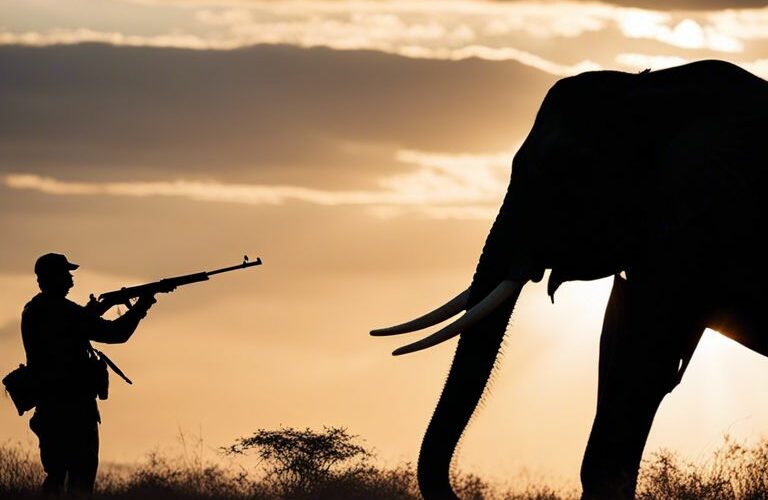You may not be aware of the barbaric practices involved in elephant hunting and the devastating impact it has on these majestic creatures. The illegal poaching of elephants for their tusks continues to threaten their existence, pushing them closer to extinction every day. It is crucial to shed light on this heartbreaking issue and take a stand against the senseless killing of these intelligent and gentle giants. Join us as we examine into the cruel reality of elephant hunting and explore why it is imperative to put an end to this brutality before it is too late.
Table of Contents
Key Takeaways:
- Illegal Killing: Elephant hunting is often carried out illegally, threatening the already dwindling population of these majestic creatures.
- Threat to Biodiversity: Elephants play a crucial role in maintaining the ecosystem, and their decline due to hunting can have devastating effects on biodiversity.
- Endangered Species: Elephants are listed as endangered species, and their hunting exacerbates their vulnerable status in the wild.
- Cruelty and Inhumanity: Hunting elephants for sport or ivory trade involves immense cruelty and violence towards these intelligent and social animals.
- Conservation Efforts: It is imperative to support conservation efforts and strengthen laws against elephant hunting to ensure the survival and well-being of these magnificent creatures.
The Current State of Elephant Populations
Clearly, the state of elephant populations worldwide is a cause for concern. The relentless practice of elephant hunting has led to a significant decline in their numbers over the years, threatening the survival of these majestic animals.
Statistics and Trends
Statistics show that in the last century, the African elephant population has declined by an alarming 97%, while the Asian elephant population has decreased by 50% in the last three generations. These trends are deeply concerning and indicate a dire need for immediate action to protect these vulnerable species.
One of the key factors contributing to the decline in elephant populations is poaching for their ivory tusks, which continues to be a lucrative and illegal trade despite efforts to combat it. Additionally, habitat loss due to human encroachment and climate change poses a significant threat to elephant populations and their ability to thrive in their natural environments.
Key Species and Their Habitats
Statistics show that the African elephant species, particularly the savanna elephant and the forest elephant, are the most affected by poaching and habitat loss. The savanna elephant inhabits grassy plains and woodlands, while the forest elephant resides in the dense rainforests of Central and West Africa.
Plus, the decline in elephant populations has far-reaching consequences not only for the elephants themselves but also for the ecosystems they inhabit. Elephants play a crucial role in maintaining the balance of their habitats by dispersing seeds, clearing vegetation, and creating pathways for other animals.
The Impact of Elephant Hunting
Ecological Consequences
It is important to recognize the detrimental ecological consequences that arise from elephant hunting. Elephants play a crucial role in maintaining the balance of their ecosystems as they are considered keystone species. Their foraging habits help shape the landscape by creating pathways for other animals and dispersing seeds that aid in plant growth and biodiversity. By reducing elephant populations through hunting, we disrupt these delicate ecosystems and put other species at risk of decline.
Moreover, elephants are vital in shaping their habitats by uprooting trees, digging watering holes, and spreading nutrients through their dung. These actions ultimately contribute to the health and sustainability of the environment. Loss of elephants due to hunting can lead to negative cascading effects on the entire ecosystem, affecting everything from vegetation to other wildlife populations.
Sociocultural Effects
Hunting elephants not only impacts the environment but also has significant sociocultural effects on communities. Many cultures revere elephants and consider them to be symbols of wisdom, strength, and prosperity. The loss of these majestic animals to hunting can have devastating emotional and spiritual repercussions on these communities, disrupting their cultural heritage and connection to the natural world.
Furthermore, elephants have been central figures in traditional practices, folklore, and rituals for generations. Their presence in these customs is deeply ingrained in the fabric of various societies. The decline of elephant populations due to hunting can lead to a loss of identity and heritage for these communities, impacting their traditions and way of life.
A deeper understanding of how the sociocultural effects of elephant hunting impact communities is vital in developing conservation strategies that not only protect the environment but also respect and preserve the cultural significance of these magnificent animals.
The Forces Behind Elephant Hunting
Once again, the forces driving elephant hunting are varied and complex. Understanding these factors is crucial in finding effective solutions to this devastating practice.
Economic Drivers
Hunting elephants for their ivory tusks has been a profitable business for centuries. The demand for ivory in certain parts of the world fuels the illegal poaching of elephants to supply this lucrative trade. Additionally, elephants are also targeted for their meat, skin, and other body parts, further increasing the incentives for poachers to kill these majestic creatures.
The economic disparities in some regions where elephants reside also play a significant role in driving this exploitation. Poverty-stricken communities may turn to hunting elephants as a means of survival or to earn quick money, perpetuating the cycle of poaching and illegal trade.
Legislative Gaps and Enforcement Issues
Issues such as weak legislation, corruption, and inadequate enforcement of existing laws contribute to the continued hunting and poaching of elephants. In some countries, laws may be lenient or poorly enforced, making it easier for poachers to operate with impunity. The lack of resources and training for law enforcement agencies also hinders their ability to combat illegal wildlife trafficking effectively.
A comprehensive and coordinated effort is needed to address the legislative gaps and enforcement issues that allow elephant hunting to persist. Strengthening laws, increasing penalties for offenders, improving surveillance and monitoring systems, and enhancing cooperation between countries are important steps in combating this cruel practice and protecting these endangered animals.
Combating Elephant Hunting
Now more than ever, it is crucial to take action to combat the alarming rates of elephant hunting that are endangering these majestic creatures. The cruel reality of elephant hunting must be stopped, and various efforts are being made on an international level to address this pressing issue.
International Efforts and Agreements
An vital step in combating elephant hunting is through international efforts and agreements. Organizations like CITES (Convention on International Trade in Endangered Species of Wild Fauna and Flora) play a significant role in regulating the trade of elephant products and enforcing strict laws to protect these animals. Through agreements between countries, a unified front can be established to crack down on illegal poaching and trafficking of elephant tusks.
Additionally, initiatives such as the Elephant Protection Initiative (EPI) bring together nations, conservationists, and policymakers to collaborate on strategies to protect elephants and eliminate the demand for ivory. By promoting awareness and implementing strict regulations, these international efforts aim to reduce the threats faced by elephants in the wild.
Successful Conservation Strategies
International collaborations have shown success in implementing conservation strategies that have helped curb elephant hunting. By focusing on habitat protection, anti-poaching patrols, community engagement, and sustainable tourism, these strategies have made a significant impact in safeguarding elephant populations.
Plus, innovative technologies like GPS tracking devices and drones have enhanced monitoring and surveillance efforts, making it easier to track elephants and detect illegal activities. With these tools, conservationists can respond swiftly to threats and protect elephants from harm.
Conclusion
Considering all points discussed, it is evident that elephant hunting is a cruel and unsustainable practice that poses a serious threat to the survival of these magnificent creatures. The impact of poaching and trophy hunting on elephant populations is devastating and must be addressed with urgency. It is imperative that strict measures are taken to end this barbaric practice and protect elephants from further harm. By raising awareness and working together to enforce regulations and penalties, we can help ensure a future where these majestic animals thrive in their natural habitats, free from the fear of being hunted for sport or profit.
FAQ
Q: Why is elephant hunting a cruel practice?
A: Elephant hunting is cruel because it inflicts unnecessary suffering and death on these intelligent and sentient animals. Elephants are often poached for their tusks, leaving behind orphaned calves and disrupting entire elephant communities.
Q: What are the consequences of elephant hunting on the ecosystem?
A: Elephant hunting has devastating consequences on the ecosystem. Elephants play a crucial role in shaping their habitats by clearing pathways, dispersing seeds, and creating water sources. Their absence can lead to imbalances in the ecosystem.
Q: How do illegal ivory trades contribute to elephant hunting?
A: Illegal ivory trades create a demand for elephant tusks, driving poaching and hunting of elephants. This illegal trade not only threatens the survival of elephant populations but also fuels criminal activities and destabilizes communities.
Q: What conservation efforts are being made to stop elephant hunting?
A: Conservation efforts to stop elephant hunting include creating protected areas, increasing anti-poaching patrols, implementing laws and regulations to ban ivory trade, and raising awareness about the importance of elephant conservation.
Q: How can individuals help in stopping elephant hunting?
A: Individuals can help stop elephant hunting by supporting conservation organizations, avoiding the purchase of ivory products, spreading awareness about the plight of elephants, and advocating for stronger policies to protect these majestic animals.

Our contributing author is a passionate advocate for eco-friendly living and sustainability. With a background in eco-life, they are dedicated to inspiring and empowering individuals to adopt environmentally conscious lifestyles. Through insightful articles, they share practical tips, innovative solutions, and thought-provoking perspectives to promote a greener, more sustainable world. Join them on the journey towards eco-smart living and discover how small choices can make a big impact. 🌱









